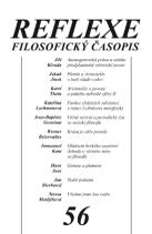Jan Patočka's Heresy in the Reflections on the Crisis of Europe
This article tries to indicate in what way the Heretical Essays could possibly be heretical. Many find these essays very provocative and have trouble in understanding them.
From the very beginning of his philosophical carrier, Patočka is an adherent to the platonic ideal of the perfect society, in spite of understanding that it is not possible to reach. Patočka supports it because he knows that it is in this direction that the hidden meaning of humanity is to be looked for. Thus he is led to a life-long study of the philosophy of history. Having thoroughly studied ontological questions, he agrees with Heidegger that it is necessary to reform Husserlian phenomenology. He does not, however, identify himself completly with the Heideggerian solution, and, keeping his Platonic position, he comes to the conclusion, that the history of Europe is history only as a care for the soul in the sense of maintaining the relation of a finite mortal soul to the unreachable transcendent source of all meaning. This relation which has to be strived for even at the price of offering one’s own life, makes the soul immortal. The contradiction contained in these formulations is, according to Patočka, a conflict in Being itself. From this platonic starting point, negative platonism developed: man is in contact with absolute meaning and truth only indirectly, but in contact with something which is necessary for giving of meaning to the individual human situation. The solution of this conflict is history. Its horrors and sacrifices are the price to be payed in the historical fight for meaning. We see the heretical trait of Patočka’s position in the unveiling and accepting of this dark element of human history and of Being as such.
Heidegger and Patočka started a movement leading to a non-metaphysical understanding of history and to the accepting of human finitude. We think, nevertheless, that it is necessary to push this anti-metaphysical movement even further, so far as to the leaving of the idea of absolute meaning, because this idea, however negative and unreachable it can be, is to our mind, in contrast to the mind of Patočka, not the condition, but the basic barrier of possibility for the individual finite human situation to have any meaning at all.
Backlinks: Reflexe 16
